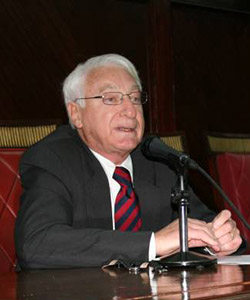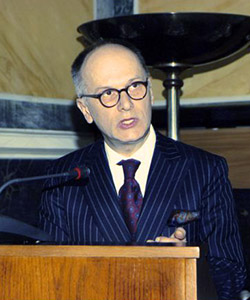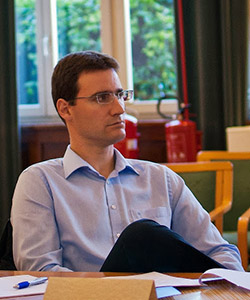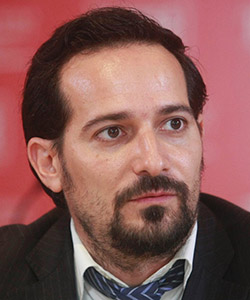 |
Brian Leiter
University of Chicago
Paper: The Roles of Judges in Democracies
Abstract
There is no such thing as “the role” of a judge in democracies, since judges and democracies differ along a variety of relevant dimensions: the nature of the judiciary, for example (e.g., civil service or politicized); or the nature and quality of the democracy (e.g., a popular democracy or a plutocracy disguised as a democracy). Some jurisprudential truths hold in all cases: law is exhausted by those norms that enjoy a positive source; and law is always indeterminate in some measure. If we put aside irrelevant moralizing conceptions of the judicial role like Ronald Dworkin’s, we can undertake a realistic appraisal of the different roles judges may need to play in modern democracies. I argue in particular against “originalism” as a theory of constitutional interpretation, not because it is indeterminate (though it generally is), but because originalism taken seriously poses a fatal threat to constitutionalism, which is always vulnerable to the objection that those living should not bear the burden of the weight of the “dead hand” of the past. |
|
 |
Riccardo Guastini
University of Genova
Paper: An Exercise in Legal Realism
Abstract
My paper is an excercise in legal realism. I shall argue in favour of seven purely realistic theses, concerning namely: (i) the relationship between legal realism and legal positivism; (ii) the concept of validity; (iii) the theory of interpretation; (iv) the ontology of law; (v) the epistemology of legal cognition; (vi) the nature of the so-called rule of recognition; (vii) the concept of obligation. |
|
 |
Michel Troper
Université de Paris Ouest – Nanterre – la Défense
Paper: A causal view of judicial interpretation
Abstract
The skeptical version of the realist theory holds that judicial interpretation, performed by an authentic interpreter, is an act of the will, that interpretation cannot be true or false and is necessarily valid, whatever its content, that it is the interpreter who is the real producer of the norm and not the author of the text subject to interpretation.
Such a theory faces some serious objections. According to one of the most difficult, if this were true, judges would not be bound to follow any rule; they would be free to decide according to their preferences or even their whims; their decisions would be without coherence or continuity. Yet, we see that law, even the judge-made law, possesses the characteristics of a system and follows certain patterns.
Using the classic distinction between having an obligation and being obliged, I will show that, while judges have no obligation to issue certain decisions, they are obliged or constrained by the system. Such an answer presupposes a causal theory of law and I will then argue in favor of such a theory. |
|
 |
Kenneth Einar Himma
University of Washington
Paper: Judicial Supremacy as a Qualified Epistocratic Constraint on Democratic Rule
Abstract
The question of what is the proper role of the judiciary in a democracy depends critically on what kind of democracy is relevant. The US Constitution contains what have been called “majoritarian” and “anti-majoritarian” pieces; the procedural provisions constitute the majoritarian pieces while the substantive constraints constitute the anti-majoritarian pieces. While these pieces are often claimed to be in tension, there is no real tension between them (unless one makes the implausible assumption that the Constitution attempts to, or should, establish a system of “pure” democracy). These pieces are expressed in the text as contrived to qualify and constrain the other in specific ways. In this essay, I argue that judicial supremacy is, given the content of the Constitution, a politically justified epistocratic constraint on democratic rule-making – or, at least, is contrived to function as such given the rules that govern who gets to serve. There are no formal educational or intellectual requirements regulating whom can be elected to Congress or the Presidency; however, this is not true for becoming a Supreme Court Justice. One must be, as far as US constitutional procedures are concerned, be licensed to practice law, which requires passing a bar exam, that demonstrates that one has the analytic and verbal skills to address highly abstract problems and justify one’s position at an acceptable level of political sophistication and intellectual abstraction. That is a good thing, from the standpoint of US constitutional morality, even if it does not guarantee that the Court produces optimal decisions. What it does do is – and the assumption in this paper is that this is the morally optimal result – is minimize the likelihood of democratic suppression of what rights the Constitution does (or, if you prefer, should) provide. |
| [hr] |
 |
Otto Pfersmann
Paper
On the fundamental distinction between motives and interpretation and the consequences of their confusion. The case for strict legal scholarship.
Abstract
Judicial interpretation is the main topic of this conference. In my contribution I shall focus on the difference between legal interpretation as an exercise in semantic analysis of texts bearing a specifically legal content, judicial norm-production as the specifically legal output in judicial decisions and opinion or motivation as the justificatory argument required in many legal systems as an element of a judicial ruling. My claim is the threefold: a) legal interpretation made by judges does not differ in nature from legal interpretation expressed by a non-judicial authors, b) judicial interpretation if any such thing there is, can only be found in motivations, c) the part of judicial motivations comprehending legal interpretation has no normative value whatsoever and cannot possibly get any such value, d) nonetheless both legal moralists and legal realists consider opinions as normative and e) do thus contribute to blur the borders of norm-production by judges – and sometimes by other organs. |
|
 |
Pierluigi Chiassoni
Università di Genova
Paper Is Realism Really at Odds with Constitutional Democracy?
Abstract
Legal realists advocate a non-cognitivist (“skeptical”) theory of judicial interpretation, boasting its truth against any variety of cognitivist (“formalist”) theory. Inside constitutional theory (the theory of contemporary constitutional democracy or constitutional state), however, realism has been charged with spreading a creationist account of adjudication that, on the one hand, overlooks the possibility for judicial interpretation to be (something very close to) a cognitive enterprise oriented to truth values, and, on the other hand, undermines the legitimacy of jurisdiction in a constitutional state by casting doubts (though mistakenly) on the very viability of the rule of law principles of legality and separation of powers. The paper purports to provide a dispassionate analysis and evaluation of the constitutional theory’s critique to realism, arguing that, on the whole, it is unsound in point of descriptive theory, and outside of the mark in point of normative theory. |
|
 |
Jasminka Hasanbegović
University of Belgrade
Paper
Legal Identity of Judge Transformed: Images of Judge in Early Modern and Contemporary Democracy
Abstract
The core of identity of judge is more or less the same from biblical times – in the Book of Judges of the Old Testament, or according to the ideas of the Last Judgement in the eschatological world views of the Abrahamic religions (Judaism, Christianity and Islam) and in the Zoroastrianism – till nowadays (either of judges in law courts and tribunals or in various sports).
Specific legal identity of judge as a holder of judicial power belongs to the modern era, when two types of judge’s images succeeded one another, but the first one has always been predominating, especially at the Continent. The former type has been presented by Montesquieu, Kant or Bentham, for example, or much later by originalists, textualists and even Dworkin. The latter type of judge’s images have been created by Hoadly, Austin, Holms, Pound, John Chipman Gray, Jerome Frank, or on the Continent, by René Marcic, among others.
Quite simplified, the former type is about images of judge as “mouth that pronounces the words of the law,” the judge as a machine or, nowadays, a computer, or Hercules for adjudication, able to find a single right solution for each case of decision-making. And the latter type is about conceptions of judge who applies the law not mechanically, but productively, taking into account all circumstances of the case, and not just the text of the law, but “all” laws of the legal order, in order to make decision not only accordant with the laws of the country, but also thereby to protect the fundamental values of the whole democratic order, given in the constitution of the community.
The central point of the paper is the critical consideration of Barak’s image of judge in contemporary democracy as Barak painted it mainly in his work The Judge in a Democracy, and in other works as well, as they are all relevant to the judicial profession. Has Barak brought something new to us, what has not been already known from Hoadly (and his Sermon preached before the King in 1717) till Marcic (and his Vom Gestzesstaat zum Richterstaat)? And secondly, whether Barak’s image of judge in modern democracy is different from the images that were painted by Barak’s contemporaries, who like him were both judges and legal scholars: Bernd Ruethers (notably in his book Die heimliche Revolution vom Rechtsstaat zum Richterstaat) and Richard Posner (primarily in his article The Role of the Judge in the Twenty-First Century)? |
|
 |
Paolo Sandro
University of Salford
Paper
A Critical Evaluation of (Moderate) Realism in Law
Abstract
Up to date, ‘radical’ versions of legal realism seem regressive in jurisprudence. Despite a variety of underpinning theoretical assumptions, the kind of realism we find prevailing in jurisprudence today has been termed as ‘moderate’, ‘tamed’ or ‘balanced’, for it purports to undermine the traditional ‘cognitivist’ picture of adjudication only for a particular class of legal cases, those that reach the stage of litigation in appellate courts. Thus the traditional account of law and legal reasoning would still hold true for the most part of rule-based phenomenology – the so- called ‘easy cases’, and to this extent> the traditional idea that the law is for the most part determinate would be confirmed. In this paper I I argue that while moderate realist accounts correctly warn us about the legitimacy and rationality of judicial adjudication in some (hard) cases, they cannot provide us with the epistemic tools to satisfactorily substantiate the distinction between easy and hard cases in the first place. If realism is to take its premises seriously, every legal case becomes a hard one, so that moderate realism is eventually self-defeating.’
|
|
 |
Luka Burazin
University of Zagreb
Paper
Rule of Recognition and Methods of Interpretation
Abstract
It is often claimed (in Anglo-American jurisprudential literature) that the rule of recognition sets the criteria for identifying legal norms and that this therefore means that methods of interpretation also form part of these criteria. Such a view is then faced with the problem of theoretical disagreements that call into question the rule of recognition itself and legal positivistic accounts of law. This paper argues that the rule of recognition sets the criteria only for sources of law and not legal norms themselves and that a theory of interpretation that distinguishes between normative texts (sources of law) and legal norms (as meanings of legal texts) can help explain why the rule of recognition is still a conventional rule based on the convergent practice of officials and the fact that officials sometimes disagree about the correct interpretation of legal texts. It is further argued that such a view of the rule of recognition is not only compatible with legal realism but also with conventionalist legal positivism.
|
|
 |
Tanasije Marinković
University of Belgrade
Paper
On the Distinction between Judicial Activism and Self-Restraint – European Perspective
Abstract
The role of the courts, notably in wielding their power of judicial review, has been the subject of one of the central controversies of modern American jurisprudence. The plea for the self-restraint sees in the Constitution a system of separate and co-equal departments. Judicial review, which has no specific authorization in the Constitution, breaches the walls of the separation and, therefor>, is contrary to the whole design. Judicial activists reply to this that the Constitution is law, that it is within the province of the courts to interpret and apply law and, accordingly, interpret and apply the Constitution. As a matter of fact, they continue, a refusal to look to the Constitution would decide the case in favor of the statute and against the Constitution.
This dichotomy, like many other terms and concepts, have been adopted unreflectively in the European context. Constitutions at the European continent are clearly law, they are brand new (in comparison to the American Constitution) and they explicitly authorize constitutional courts to review constitutionality of legislative acts. It follows that judicial review of constitutionality has never been in question, as such, in the European liberal democracies.
Thus, the debate whether a given constitutional court is activist or modest seems displaced in Europe. Either the constitutional court effectively exercises its constitutionally mandated authority to review legislative acts or it does not. However, in both of these two set of cases we can distinguish situations in which the court grounds its decision in very abstract and vague legal terms, the specific articulation of which the epistemic community disagrees about, even though it had an option of more straight forward answer.
Only then, this paper claims, one can speak of judicial activism, or better judicial politics, in the European context. And it can be strong or weak depending on whether the court’s reasoning, be it constructivist or preservationist, opposes or supports the parliament’s will. In other words, and contrary to the conventional understanding, the constitutional court may act as a political agent both when it accepts and refuses its jurisdiction, and in the case of the former when it upholds and overturns the contested legislation. The dividing line is whether its arguments are within recognized co conventions of judicial reasoning. |
|
 |
Bojan Spaić
University of Belgrade
Paper
Legal Interpretation and Epistemic Authority
Abstract
The relations between authority and legal interpretation have been widely neglected in contemporary legal theory. In this /em>paper I’ll lay out the grounds for the discussion about the sociological and philosophical conceptions of power and authority in order to access their relevance for the theory of legal interpretation. The main hypothesis is that the problems of the practice of legal interpretations in contemporary legal systems are by and large solved not by resorting to philosophies of language nor by doctrines of legal interpretation, but by relying on various kinds of authorities. The paper will present 1) an analysis of authority that will lead to the kinds of authority that are relevant for legal interpretation, and argue that 2) the proper way to understand these authorities is by employing the concept of institutional control of legal interpretation. The analysis substantiates the conclusion that authority is a key component of understanding judicial interpretation as a stipulative enterprise, without implications of arbitrariness.
|